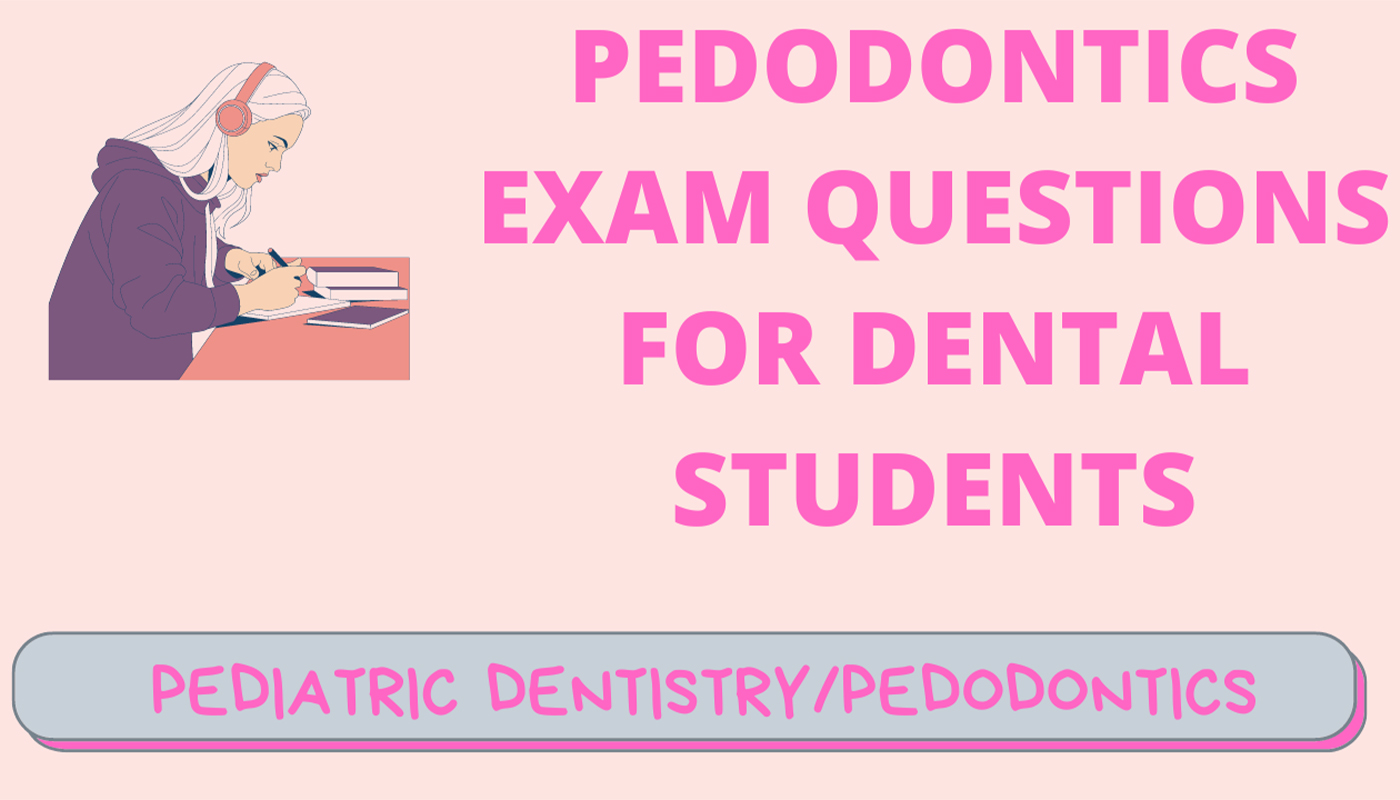
Pediatric Dentistry Important Exam Questions
Hi everyone sharing with you important questions asked in previous year Pedodontics/Pediatric dentistry examination in various universities. Hope these questions help you to know which topics are important. If you find these helpful please let me know in the comment box below. All the best in advance!!!
Long Questions
- Discuss development of occlusion from birth to adolescence.
- Define and classify habits. Discuss the clinical features and management of Thumb-sucking habit and tongue thrusting.
- Classify theories of child psychology. Write in detail about psychoanalytical theory.
- Define and classify Space maintainers. What are the factors to be considered before prescribing space maintainers to your child patient? Write in detail about band and loop space maintainers.
- Describe management of class III (Ellis and Davey) fracture of upper permanent central incisor of an 8-year-old boy.
- Write about the etiology, clinical features and management of primary herpetic gingivostomatitis.
- What is Early childhood caries (ECC)? Outline the etiology and management of ECC.
- Enumerate different theories of child psychology. Explain Jean Piaget’s cognitive theory.
- Define child abuse and neglect. Write about dental neglect in detail.
- Classify oral habits. Discuss briefly the etiology, clinical features and management of mouth breathing habit.
- Classify Behaviour Management. Write in detail about Non-pharmacological behaviour techniques.
- Differentiate between pulpotomy and pulpectomy. Write in detail about materials used in pulpotomy.
- Classify oral habits. Describe in detail about mouth breathing habits and its effect on orofacial structure.
- Discuss space management. Write in detail about eruption guidance appliance.
- Discuss Ellis and Davey’s classification. Write in detail the protocol for reimplantation of an avulsed tooth.
- Describe various changes that occur in the transitional period of dentition.
- Define pulpotomy. Write about the classification, indications, and contraindications of pulpotomy.
- Describe management of class III (Ellis and Davey) fracture of upper permanent central incisor in an 11-year-old boy.
- Classify theories of child psychology. Compare Freud’s theory with Erickson’s theory.
- Classify fluorides based on uses. Enumerate in detail about the Knutson’s technique of topical fluoride application.
- Enumerate morphological and histological differences between primary and permanent teeth. Discuss in detail the modifications in a conventional class II cavity preparation in primary second molars based on these differences. Mention the principles of minimal intervention dentistry.
- Write in detail about the treatment of an Avulsed tooth.
- Define and classify Pulpotomy. Write in detail about formocresol pulpotomy.
- Define dental caries. Describe in detail the pathophysiology of rampant caries.
- Write Ellis and Davey’s classification of traumatic injury to anterior teeth. Outline the treatment of intruded upper primary anterior teeth in a 4-year-old child.
Short Note
- Isolation
- Erythroblastosis fetalis
- Pit and fissure sealants
- Dunlop’s beta hypothesis
- Ugly duckling stage
- Diet counselling
- Tell-show-do technique
- Gum pad
- Balanced diet
- Dental fluorosis
- ANUG
- Natal and neonatal tooth
- Distal shoe space maintainer
- Infant oral health and anticipatory guidance
- Matrices used in pediatric operative dentistry
- Definition and scope of pediatric dentistry
- Contingency management
- Anterior Cross Bite
- Brushing methods for children
- Stainless steel crown
- Scope of Pedodontics
- Good effect v/s bad effects of fluoride
- Cvek’s pulpotomy
- Modification of key’s triad
- Difference between indirect and direct pulp capping
- Euphorism
- Turner’s hypoplasia
- Voice control
- APF Gel
- Frankel’s behaviour rating scale
- Apexification
- Feeding appliance
- ECC and its pattern of development
- Serial Extraction technique
- Psychic triad
- Fluoride varnish
- Preventive Resin Restoration (PRR)
- Band and loop space maintainer
- Pre-appointment behaviour modification
- Composite restorative materials
- Pedodontic treatment triangle
Recommended Books for Pediatric Dentistry :-


